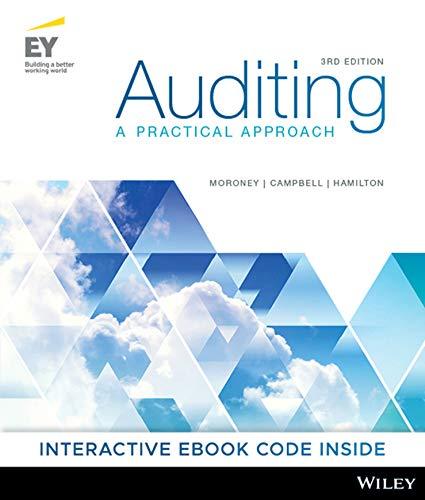Question
6C. Part 2. Enterprise Fund Transactions The City of Monroe maintains a Water and Sewer Fund to provide utility services to its citizens. As of
6C. Part 2. Enterprise Fund Transactions
The City of Monroe maintains a Water and Sewer Fund to provide utility services to its citizens. As of January 1, 2015, the City of Monroe Water and Sewer Fund had the following account balances:
|
| Debits | Credits |
| Cash | $105,000 |
|
| Customer Accounts Receivable | 77,000 |
|
| Estimated Uncollectible Accounts Receivable |
| $4,000 |
| Materials and Supplies | 28,000 |
|
| Advance to Stores and Services Fund | 30,000 |
|
| Restricted Assets | 117,000 |
|
| Water Treatment Plant in Service | 4,200,000 |
|
| Construction Work in Progress | 203,000 |
|
| Accumulated Depreciation - Utility Plant |
| 1,200,000 |
| Accounts Payable |
| 97,000 |
| Revenue Bonds Payable |
| 2,500,000 |
| Net Assets |
| 959,000 |
| Totals | $4,760,000 | $4,760,000 |
Required:
a. Open a general journal for the City of Monroe Water and Sewer Utility Fund and record the following transactions.
USE ONLY THE FOLLOWING ACCOUNTS FOR THE JOURNAL ENTRIES- CASH, CUSTOMER ACCOUNTS RECEIVABLE, ESTIMATED UNCOLLECTIBLE ACCOUNTS, DUE FROM GENERAL FUND, MATERIALS & SUPPLIES INVENTORIES, ADVANCE TO SUPPLIES AND STORES FUND, WATER TREATMENT PLANT, ACCUMLATED DEPRECIATION-WATER PLANT, CONSTRUCTION IN PROCESS, RESTRICTED ASSETS, ACCOUNTS PAYABLE, PAYROLL TAXES PAYABLE, DUE TO STORES & SERVICES FUND, REVENUE BONDS PAYABLE, NET POSITION (beginning), REVENUES-CHARGES FOR SALES & SERVICES, OPERATING EXPENSES COST OF SALES & SERVICES, OPERATING EXPENSES SELLING, OPERATING EXPENSES ADMINISTRATION, OPERATING EXPENSES DEPRECIATION, NON OPERATING EXPENSES INTEREST.
(1) During the year, sales of water to non-government customers amounted to $1,002,000 and sales of water to the General Fund amounted to $37,000.
(2) Collections from non-government customers amounted to $962,000.
(3) The Stores and Services Fund repaid $15,000 of the long-term advance to the Water and Sewer Fund.
(4) Materials and supplies in the amount of $257,000 were received. A liability in that amount was recorded.
(5) Materials and supplies were issued and were charged to the following accounts: cost of sales and services, $164,900; selling, $15,000; administration, $18,000; construction work in progress, $50,000.
(6) Payroll costs for the year totaled $416,200 plus $34,200 for the employers share of payroll taxes. Of that amount, $351,900 was paid in cash, and the remainder was withheld for taxes. The $450,400 (416,200 + 34,200) was distributed as follows: cost of sales and services, $265,800; sales, $43,900; administration, $91,400; construction work in progress, $49,300.
(7) Bond interest (6%) in the amount of $162,500 was paid.
(8) Interest in the amount of $17,000 (included in 7 above) was reclassified to Construction Work in Progress.
(9) Construction projects at the water treatment plant (reflected in the beginning balance of construction in process) were completed in the amount of $203,000, and the assets were placed in service. Payments for these amounts were made in the previous year (no effect on 2015 Statement of Cash Flows).
(10) Collection efforts were discontinued on bills totaling $3,020. The unpaid receivables were written off.
(11) An analysis of customer receivable balances indicated the Estimated Uncollectible Accounts needed to be increased by $5,500.
(12) Payment of accounts payable amounted to $297,900. Payments of payroll taxes totaled $95,200.
(13) Supplies transferred from the Stores and Services Fund amounted to $58,000. Cash in the amount of $50,000 was paid to the Stores and Services Fund for supplies.
(14) Depreciation expense for the year was computed to be $275,000.
(15) In accord with the revenue bond indenture, $25,000 cash was transferred from operating cash to restricted assets.
Prepare and post an entry closing all nominal accounts to Net Assets. Compute the balance in the net asset accounts, assuming the only restricted assets are those identified with the bond indenture and the outstanding bonds are associated with the purchase of capital assets.
Step by Step Solution
There are 3 Steps involved in it
Step: 1

Get Instant Access to Expert-Tailored Solutions
See step-by-step solutions with expert insights and AI powered tools for academic success
Step: 2

Step: 3

Ace Your Homework with AI
Get the answers you need in no time with our AI-driven, step-by-step assistance
Get Started


